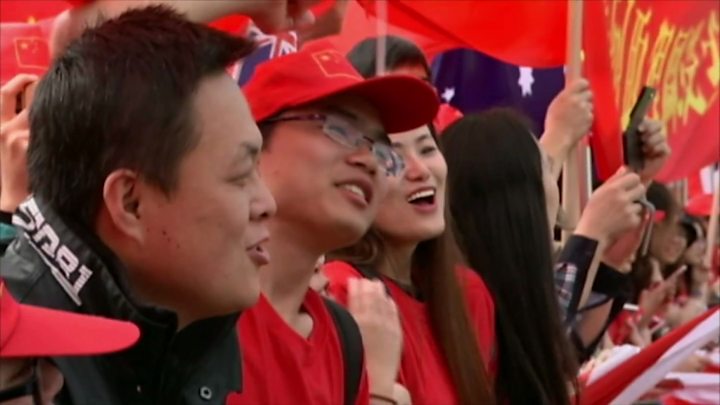Australia is to formally investigate foreign interference in its universities amid rising concerns about Chinese influence on campuses.
The push follows reports of students and staff "self-censoring" on sensitive political issues such as the pro-democracy protests in Hong Kong.
Universities had also increasingly been targeted by state-sponsored cyber attacks, the government said.
It announced an intelligence taskforce on Wednesday to combat such threats.
"Universities must act to protect the valuable information they hold where it is in the national interest to do so," Education Minister Dan Tehan said in a national address.
He linked efforts to tackle foreign interference to "broader" efforts to protect free speech and academic freedom on campuses.
Universities Australia, a representative group, welcomed the announcement but said a "careful balance" was needed.
"We must continue to safeguard our security without undermining the invaluable asset of our openness," Chair Prof Deborah Terry said on Wednesday.
Why is there concern now?
While the government did not name any countries on Wednesday, there have been recent concerns about China's alleged influence on campuses.
This was highlighted in recent weeks by violent clashes at a number of Australian universities between students supporting the pro-democracy protests in Hong Kong and mainland Chinese students defending their government.
"We must... encourage an environment where disagreement does not involve verbal attacks or threats," Mr Tehan said on Wednesday.
"The sense that some students and staff at universities are self-censoring out of fear they will be shouted down or condemned for expressing sincerely held views and beliefs, or for challenging widely accepted ideas, should concern all of us," he said.
Tensions have also arisen from previous reports of Chinese students aggressively disputing the curriculum in Australian classrooms.
Australia's higher education sector has been criticised for being heavily financially reliant on international enrolments. Chinese students account for close to a third of international students in Australia.
What are the aims of the taskforce?
The government says its University Foreign Interference Taskforce - made up of intelligence agencies, education bureaucrats and university leaders - is aimed at strengthening the cyber defences of universities.
Just last month, the Australian National University confirmed it had been the target of a massive data hack, where the personal information of 200,000 students and staff was stolen.

Media playback is unsupported on your device
"According to the latest advice from the Australian Cyber Security Centre, the targeting of Australian universities continues to increase," Mr Tehan said on Wednesday.
He said the group would also develop safeguards to help universities protect their research and intellectual property, and to make foreign academic collaborations more "transparent".
What other actions have been taken?
Australia introduced new laws in 2017 that require foreign organisations to identify their state connections publicly on a government register.
The government is investigating the role of Confucius Institutes - Chinese language and cultural centres funded by the Chinese government- which are present on many campuses but not presently registered.
Concerns about the institutes also prompted the New South Wales state government last week to cancel the organisation's contracts to teach Chinese language programmes in its public schools. The decision has been criticised as "hysteria" by Chinese state media.
Two Australian universities have also announced reviews of its research and funding collaborations, following reports its researchers may have unwittingly collaborated with a Chinese-state owned military technology company accused of human rights abuses.
https://www.bbc.com/news/world-australia-49492206
2019-08-28 07:26:50Z
52780364875410
Tidak ada komentar:
Posting Komentar